Archive
Meeting on IT law with Kyoto University, Graduate School of Law
The Department of Innovation and Digitalisation in Law, University of Vienna, held a hybrid meeting on IT law with Kyoto University, Graduate School of Law, on Thursday, February 9th.
Members of the Japanese and Austrian academic communities as well as practising lawyers attended the joint lecture.The lecture included presentations on automated governance in Japan by Tatsuhiko Inatani, Professor, Kyoto University, Graduate School of Law, and presentations of the department's ongoing AI-related projects ProCAncer-I, TRUSTEE and OPTIMA by Katerina Polychronopoulos and Clara Saillant, both from Department of Innovation and Digitalisation in Law, University of Vienna.
Air Defence Identification Zones in State Practice: The Example of Japan
Under the Mobility Fellowship between the University of Vienna and Kyoto University a research project was funded in order to analyze the concrete obligations of the Japanese Air Defence Identification Zone (ADIZs) as part of Mag. Stephanie Stipsits, LL.M. doctoral thesis (Air Defence Identification Zones: Legality and Forms with Respect to Maritime Territorial Disputes).
Air Defence Identification Zones (ADIZs) are established in national as well as international airspace in order to identify aircraft for security and safety purposes. ADIZs are neither permitted not prohibited in international law and form contentious State practice. So far approximately 25 States have created an ADIZ and a comprehensive analysis of national law as well as Aeronautical Information Publication showed a divergent picture on a potential customary international law on such zones in international airspace. Of particular interest for the discussion on the legality of ADIZs in international airspace is the East China Sea area, where four States claimed an ADIZ, namely China, Japan, Taiwan and South Korea. This led to the interesting situation of overlapping zones with competing obligations raising the question on the exact scope of such zones.
On 21 October 2022, Mag. Stephanie Stipsits visited with support from Professor Dai Tamada (Kyoto University) and Professor Akira Mayama (Osaka University) the National Institute of Defense Studies in Tokyo to conduct an interview with high-ranking air self-defense officials. The throughout discussion revealed that in contrast to the majority of State practice, Japan´s ADIZ rules are designed as non-binding instructions.
The Japanese Defense Agency Directive No. 36 from 1969 sets the national framework for the Japanese ADIZ in international airspace. Even though characterized as voluntary, the non-compliance with the Japanese ADIZ´s identification rules led to the interception of the non-complying aircraft. Alone in 2021, 1.004 interceptions on foreign military aircraft were exercised by Japan Air Self-Defense Forces in international airspace. One can hardly speak of a voluntary character if coercive measures are undertaken in case the aircraft does not identify according to the ADIZ’s rules.
Moreover, the Chinese ADIZ and the Japanese ADIZ overlap over the disputed Senkaku/Diaoyu Islands, which are claimed by both States as being part of their territory. The concern was expressed that the progressive exercising of aerial control above these islands may influence the territorial status and harden sovereignty claims. On the question whether the establishment of the Chinese ADIZ above the disputed Senkaku/Diaoyu Islands had the intent to strengthen China´s territorial claim, Japanese officials denied any dispute altogether. Instead, they perceived the Chinese ADIZ as a political symbol and part of China´s foreign affairs strategy.
The Japanese ADIZ forms a unique example of a set of rules which are theoretically non-binding on foreign aircraft in international airspace but are in fact connected with enforcement measures in case of non-compliance. This certainly is an interesting aspect for the comparative analysis of State practice, the exercise of prescriptive as well as enforcement jurisdiction in international airspace and the overall conclusion on ADIZs as a rule of customary international law.
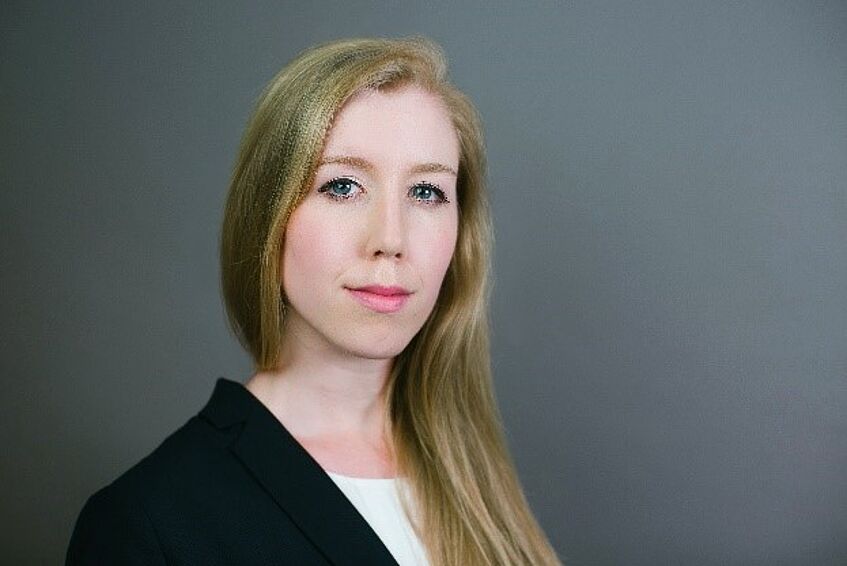
Mag. Stephanie Stipsits, LL.M. has been working as researcher and lecturer at the Department of European, International and Comparative Law of the University of Vienna since October 2020.
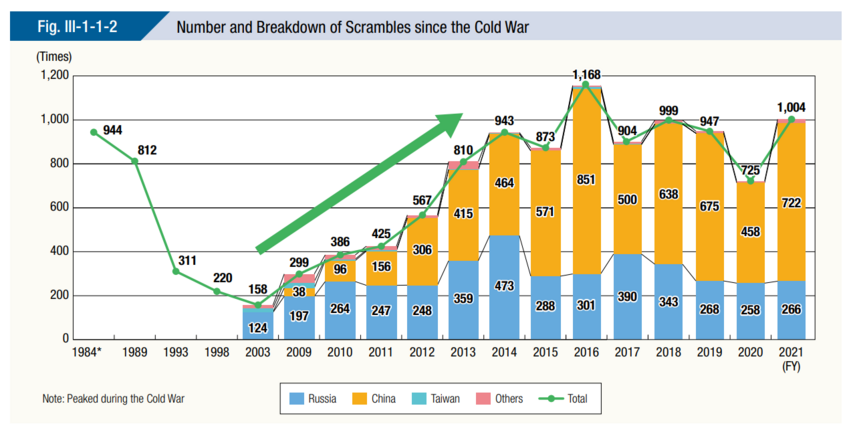
Japanese Ministry of Defense, ‘Defense White Paper’ (2022), p. 242
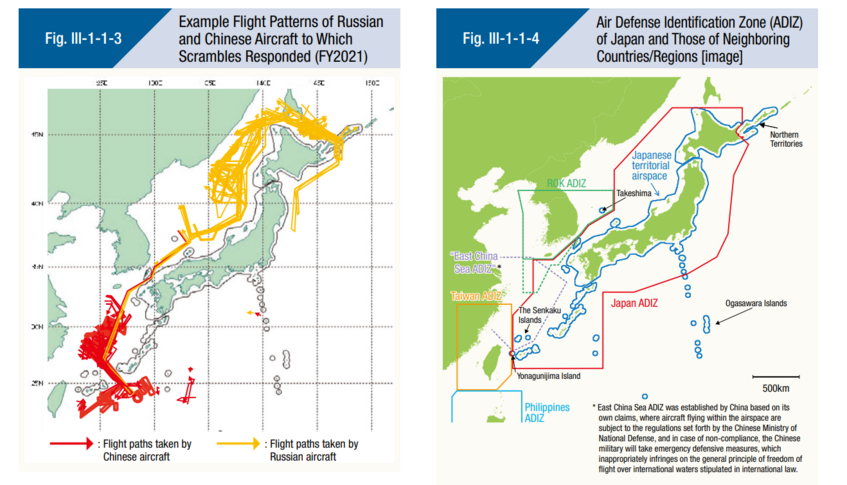
Japanese Ministry of Defense, ‘Defense White Paper’ (2022), p. 242
Seminar in Kyoto: Impact of COVID-19 on Society
In September the conference "Impact of COVID-19 on Society" took place at the Faculty of Law at the Kyoto University, which was organized by Prof. Dr. Wolfgang Mazal (Labour and Social Security Law at University of Vienna) and Prof. Takashi Muranaka (Labour at Kyōto University). In addition to numerous researchers from Japan and Austria, eight students from the University of Vienna participated in the conference again this year as part of a student seminar.
Dr. Buchebner-Ferstl (University of Vienna) opened the first session with her presentation on the social impact of COVID-19 with a special focus on family relations. The presentation was followed by Assoc. Prof. Asato (Kyoto University), who addressed the socio-economic impact of COVID-19 on foreign residents in Japan.
The second session was started by Assoc. Prof. Otonashi (Kyoto University), who examined the handling of COVID-19 in Japan from the perspective of personal information protection. Concluding the first day was Univ.-Prof. Eisenberger (University of Vienna) with her presentation on the constitutional aspects of Covid-19.
Dr. Thomas Dullinger (University of Vienna) started the second day of the seminar with a presentation on the social security aspects of COVID-19, followed by Prof. Takahata (Kyoto Sangyo University) who addressed the question of how the Corona disaster affected social protection in Japan.
The last day of the seminar was opened by Univ.-Prof. Windisch-Graetz (University of Vienna) with her presentation on COVID-19 in labor law. In the last presentation of this seminar, Assoc. Prof. Karaiskos (Kyoto University) focused on the COVID-19 pandemic from the perspective of consumer protection and education.
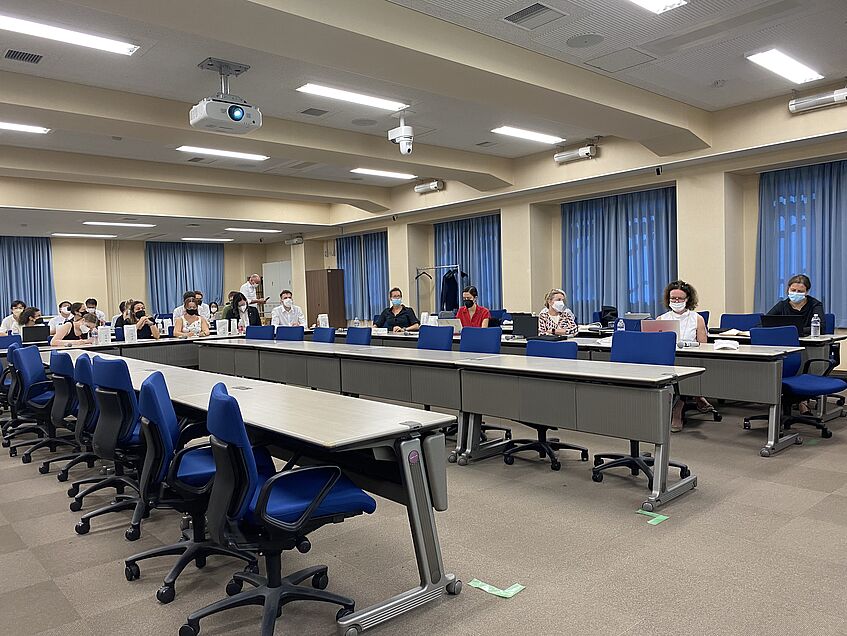
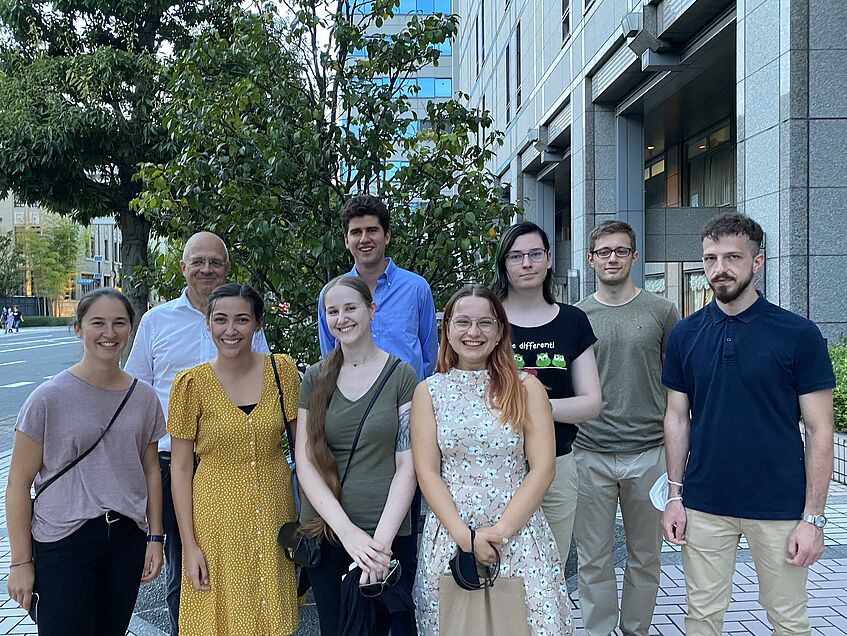
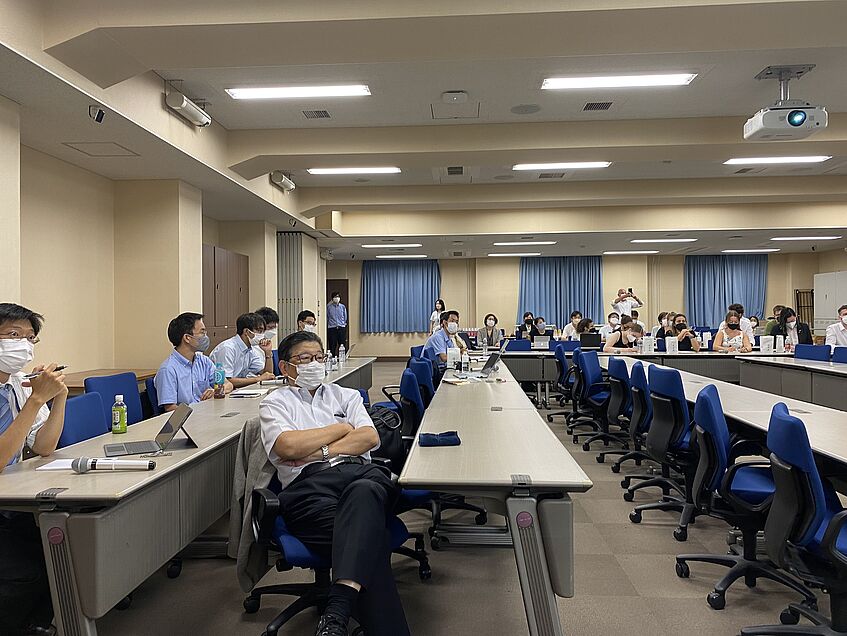
Modern China: Law, History, and Culture
Prof. WANG Chang, affiliated with die CUPL (China UNiversity of Political Sciences ans Law) and Attorney with ThomsonReuters, Minneapolis (MN), explained as Visiting Professor to Vienna University in Mai 2022 History and actual Status of Chinese legal System. Wang is the second Chinese ever elected to the prestigious American Law Institute (ALI). In 2017, Minnesota Governor Mark Dayton appointed Wang as a trustee of the Minnesota Zoological Board. In 2018 Chief Justice Lorie Gildea of the Minnesota Supreme Court appointed Wang as a member of the Minnesota State Board of Continuing Legal Education.
The course provided a comprehensive overview of law and politics of 20th and 21st-century China, in their historical and cultural contexts. Law, History, and Culture on Modern China were discussed within a focus on the “Rule by Law Concept” as a “grand narrative” in its historical context.
Students enthusiastically reported the high didactical level and the deep insights of this lecture:
- "One of the key takeaways is, as already mentioned above, that China is a very complex subject. To understand Chinas actions now it is crucial to understand its past.”
- "I can say that I am very surprised how the course helped me with critical thinking.”
- "In conclusion I would say, that this course greatly helped me in connecting a lot of things I already knew, to how China is today, and why China is like that today. If I ever had the chance to attend one of your courses again, I would be very happy to do that. Thank you very much, I did not only learn a lot, but also had a lot of fun while doing so.”
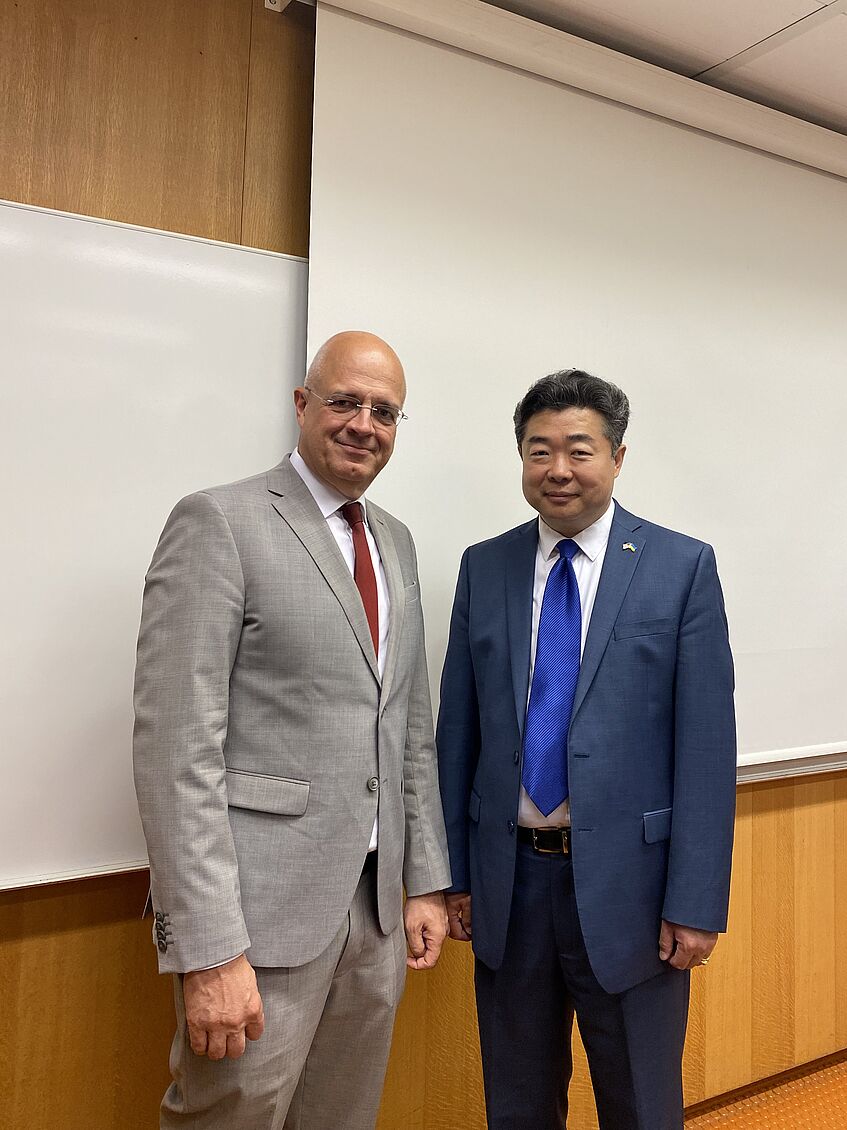
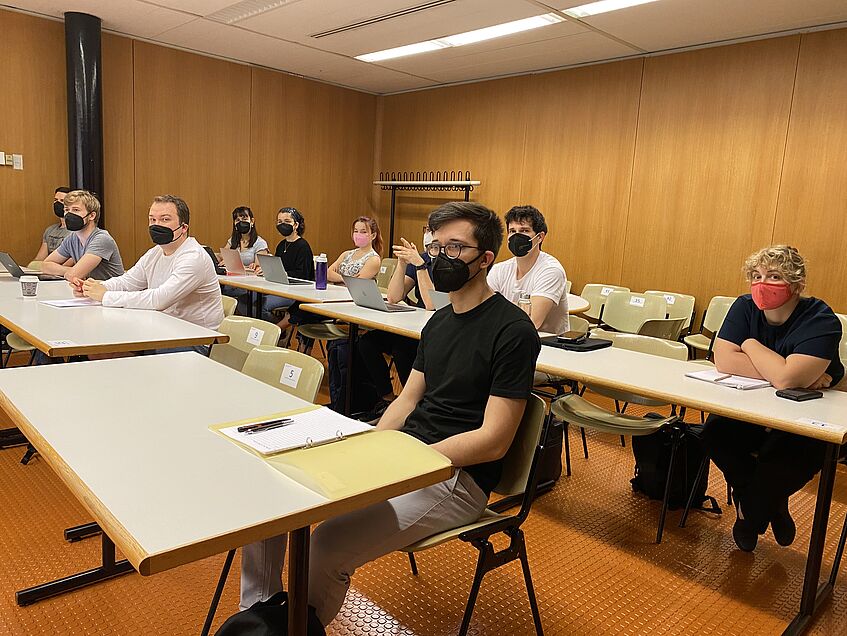
Beyond preponderance of evidence?
On 27.01.2022 Univ.-Prof. DDr. Peter Lewisch gave a lecture on the topic of "proof". In the course of the lecture Prof. Lewisch dealt with substantive law as well as procedural law. The focus of his research was the question of the applicable standard of proof in different contexts. The lecture dealt with both comparative law and law and economics perspectives.
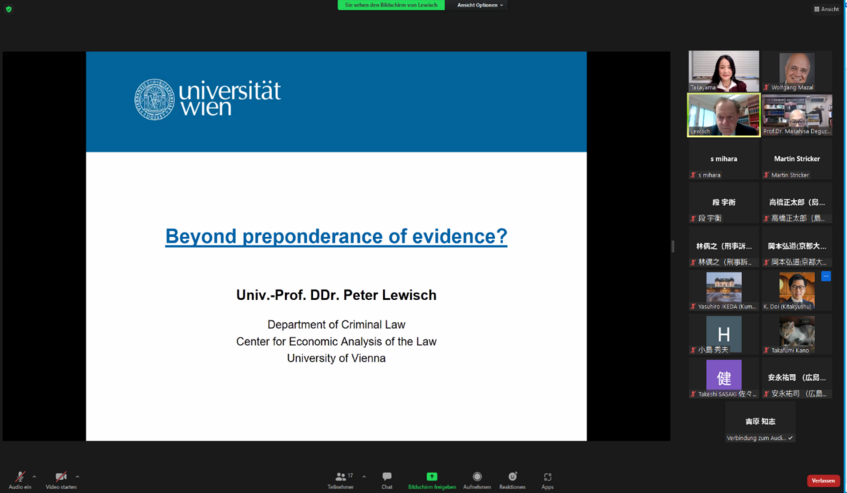
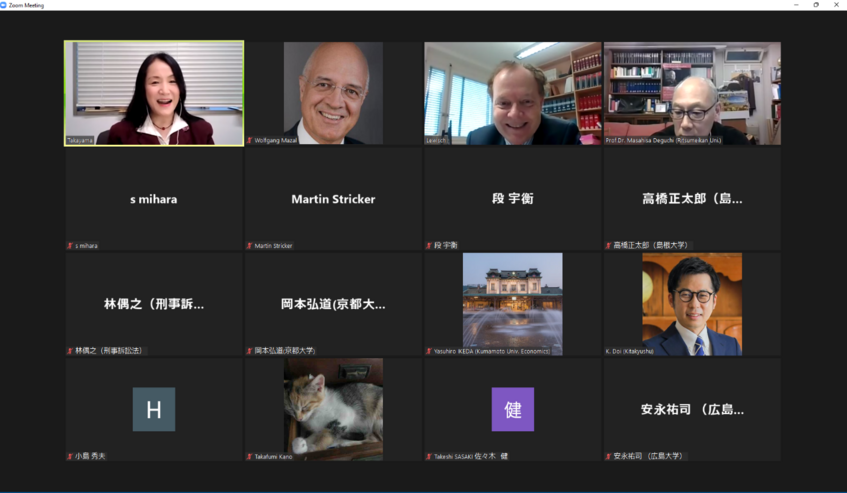
COVID-19 Arbeits- und Sozialrecht Österreich – Japan
Europäische und asiatische Gesellschaften verfolgen in der Bewältigung der COVID‑19-Pandemie unterschiedliche Ansätze, die auf Unterschieden in den politischen Systemen, im Menschenbild und im Gesellschaftsverständnis wurzeln.
Ob sich rechtliche Unterschiede – Japan hat beispielsweise ein stärker an Freiheit orientiertes Verfassungsverständnis, nach dem beispielsweise Ausgangssperren nicht zulässig sind – im Alltag auswirken oder durch außerrechtliche Verhaltenssteuerung ergänzt werden, kann am Beispiel der Arbeitswelt überprüft werden.
In einem Seminar, das die Universität Wien und die Kyoto-Universität als Videokonferenz am 11.5.2021 im Rahmen ihrer strategischen Partnerschaft veranstalteten, wurden rechtliche und faktische Fragen der Bewältigung der COVID-19 Pandemie im Arbeits- und Sozialrecht erörtert.
Referenten
Dullinger Thomas, Dr. iur. Universität Wien (Institut für Arbeits- und Sozialrecht)
INATANI Nobuyuki, Ph.D. Osaka Universität für Wirtschaft und Recht (Law Faculty)
Vienna Taiwan Lecture Series
The Department of East Asian Studies/Sinology and the Vienna Center for Taiwan Studies are pleased to announce a lecture by
Manfred Nowak
Global Campus of Human Rights, Venice
Date: Thursday 15th April, 2021
Time: 12:00 - 13:30 CET
Location: Online. Please register here: bit.ly/2OfHjv2
This lecture will address human rights monitoring in Taiwan, both generally and with a specific focus on children’s rights and children deprived of liberty. First, I will discuss the question of why Taiwan ratifies international human rights treaties despite the fact that the United Nations do not formally accept the State’s ratifications. In this regard, I will speak from my personal experience leading, since 2012, the International Review Committee on Taiwan concerning the two human rights covenants, the International Covenant on Civil and Political Rights (ICCPR) and the International Covenant on Economic, Social and Cultural Rights (ICESCR). Following this, I will address the context of children’s rights and deprivation of liberty of children in particular. This part of the lecture is based on the United Nations Global Study on Children Deprived of Liberty which I led and presented to the UN General Assembly in 2019.
For further information please click here.
Online Course: Belt and Road Initiative - Legal Aspects
Recommendation: China Law Society in cooperation with Shanghai University of Political Science and Law will host a "free of charge" Online Course on legal aspects of the Belt & Road Initiative!
For further details see the invitation!
Joint Lecture on IT-Law
The Department of Innovation and Digitalisation in Law of the University of Vienna and the Graduate School of Law of Kyoto University organise a „Joint Lecture on IT law“, focussing on actual topics of IT-Law.
July 29th, 2020, 10:00 bis 11:30 am (UTC+2)
Contact Tracing Apps - Japanese perspective
Masahiro Sogabe, Professor, Graduate School of Law, Kyoto University
Contact Tracing Apps - Austrian perspective
Nikolaus Forgó, Professor, Department of Innovation and Digitalisation in Law, University of Vienna
Invitation
This is an Invitation only Event with Chatham-house rule.
For Invitation please turn to Žiga Škorjanc ziga.skorjanc@univie.ac.at
Lecture by Nai-Yi Sun (National Taiwan University)
On Nov 6th 2019, 18:30-20:00 professor Nai-Yi Sun (National Taiwan University) gave a lecture on "Die Adaption, Implementation und Herausforderungen der UN-Behindertenrechtskonvention in Taiwan". The guest lecture is organised by the Department of East Asian Studies/Sinology and the Vienna Center for Taiwan Studies.
Seminar and Summer School in Kyoto
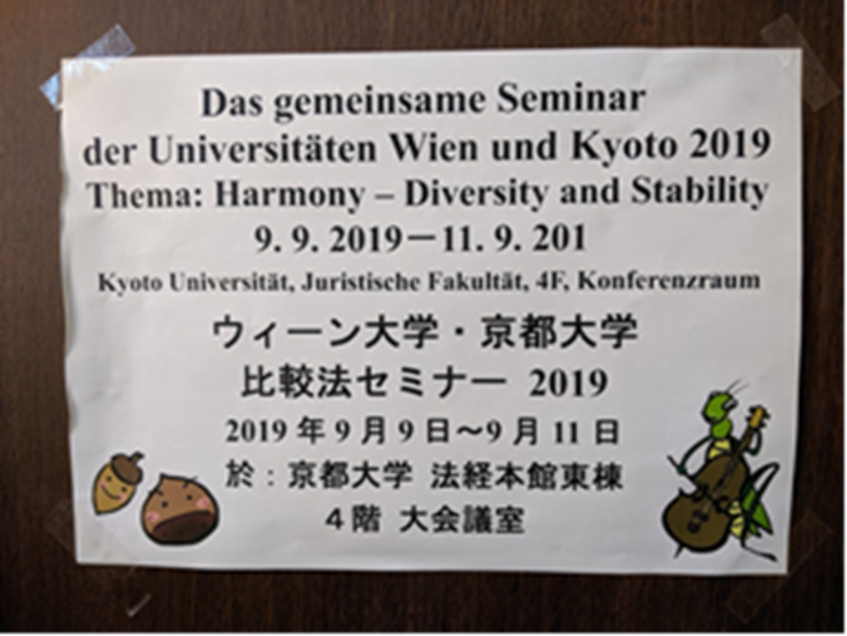
Seminar and Summer School in Kyoto
Following a 30 years cooperation between In September the conference "Harmony - Diversity and Stability" took place at the Faculty of Law at the Kyoto University, which was organized by Prof. Dr. Wolfgang Mazal (Labour and Social Security Law at University of Vienna) and Prof. Takashi Muranaka (Labour at Kyōto University). Based on numerous research activities, which were carried out to a large extent on the subject of "migration", the aim was to discuss legal and socio-political approaches to problems of reconciliation both in Japan and Austria. To view the program please click here.
Under the umbrella of the strategic partnership between the University of Vienna and the University of Kyoto this year 14 students of the Faculty of Law of the University of Vienna took the chance to participate in the seminar as part of a University Vienna Summer School. For further information regarding the summer school please click here.
The seminar started with a presentation by Prof. Wako Asato (University of Kyoto) on „New Migration Policy and Its Challenges in Japan: An example of elderly care“. He made an overview of the latest migration reform in Japan and its characteristics; the migration flows and their continuity or discontinuity and the discrepancy between the institutional concept and its actual implementation. Prof. DDr. Peter Lewisch (University of Vienna) focussed his contribution on "Negotiation techniques to reach a compromise in case of divergence of opinion", and explained the common goal of negotiating techniques, namely to overcome negotiation mistakes. Prof. Kimiyoshi Inamori (Kyoto University) presented on "Foreigners and the Social Security System in Japan“ and described the status of foreigners in social needs. Prof. Dr. Franz-Stefan Meissel (University of Vienna) dedicated his presentation to a specific problem of Austrian post-war history and informed about "Reconciliation and Law - Austrian Restitution Measures for Nazi Victims after 1945 and Today“. In his lecture Meissel mentioned that Austria and Japan faced similar problems as atrocities and immorality, forced labour, rape, extermination camps in some periods of the 20th century but showed, how it might be possible to overcome the dark past at least to meet needs of victims and their survivors.
Dr. Sonja Dörfler (Austrian Institute for Family Studies) gave a presentation on "Cultural Diversity in Education and Family Images", referring a study that explored the concepts, ideas and family values of young people in Austria with Turkish, former Yugoslav, Chinese and other immigrant backgrounds. Prof. Junko Kawei (Kyoto University) gave a presentation on "Conditions and Policies of Japanese Language and Cultural Education: Considering the career aspirations of international students": She gave an overview on the conditions and guidelines for Japanese language and cultural education, taking into account the career goals of international students. Prof. Shotaro Hamamoto (Kyoto University) gave a presentation on "An Analysis of Japan's Immigration Control System from an International Law Perspective", who addressed the problem of residence permits for technical interns as well as for foreign students, which should actually be training programmes but are actually misused to attract cheap workers. Prof. MMag. Dr. Schulev-Steindl, LL.M. (University of Graz) gave a presentation on "Climate Law Suits against States“, in which she discussed the cases of Urgenda (Netherlands), Ashgar Leghari (Pakistan), People vs. Artic Oil (Norway), Kain et al. v. Massachusetts Department of Environmental Protectio (USA), Kelsey Juliana; Xiuhtezcatl Martinez et al. The United States of America (USA), Union of Swiss Senior Women for Climate Protection v. Swiss Federal Council (Switzerland), Armando Ferraro Carvalho and Others v. EU Parliament and the first climate action against Austria.
In the final session Dr. Olaf Kapella (Austrian Institute for Family Studies) did a presentation on "Aspects of the parent-child relationship. Differences between Austria and Japan - theoretical remarks on country comparisons". The focus of this presentation was on Parental Ethnic Theory. This is the approach to understand the culture-specific regulation of the child's micro-level. In other words: it focuses on the position of the child in society and its influences. And, last but not least, Prof. emeritus Hideo Otake (Kyoto University) gave a presentation on „Social Movements in Japan“, in which he discussed the social movements that developed after the Tohoku Earthquake and tsunami and the Fukushima accident.
Guest Professorship at Kyushu University
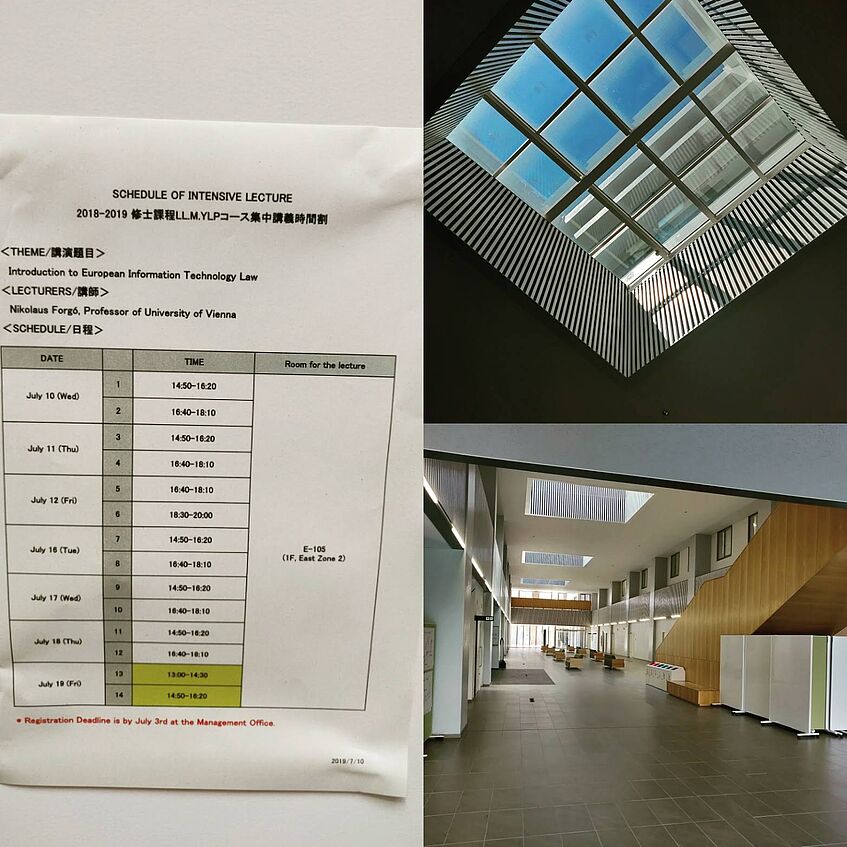
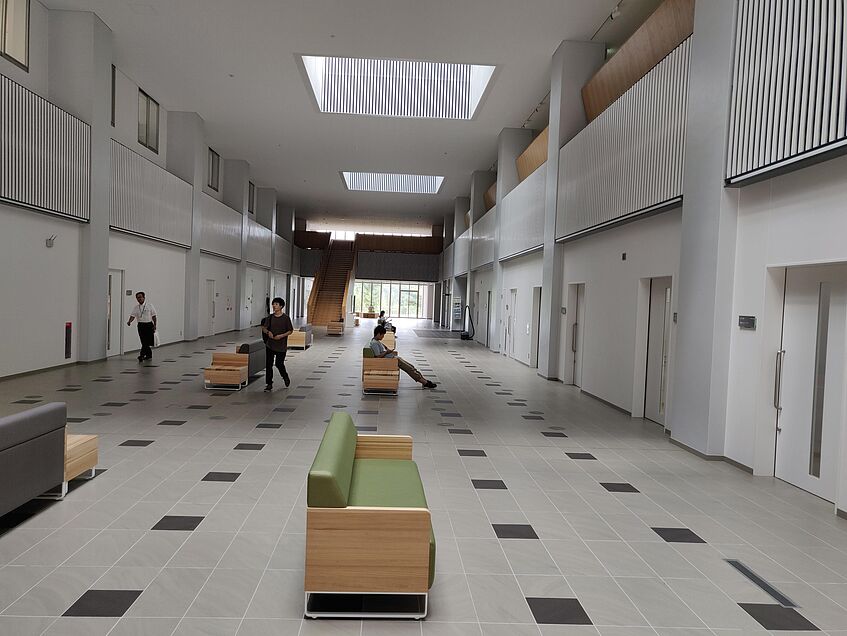

Guest Professorship at Kyushu University
In July 2019, Nikolaus Forgó (Department of Innovation and Digitalisation in Law) was again invited to lecture and do research at Kyushu University’s LLM-programme as a guest professor. Forgó taught a course in “European Technology Law” and was – again – deeply impressed by the faculty, the student body and the new campus in Fukuoka.
In 2019 the law school has moved on campus so that students and staff profit from a very modern environment with modern facilities, including a huge library, diverse e-learning facilities and modern seminar rooms. The campus is located outside city center very close to the sea with beautiful beaches and possibilities for leisure activities.
Kyushu’s LL.M. and other international programs attract – due to their outstanding reputation - not only Japanese students. So that citizens from many Asian Countries, such as China, South Korea, the Philippines or Thailand form the student body. In addition, Europeans regularly find their way to Fukuoka, so that different legal traditions are united in class and profit from each other. Forgó appreciates, in particular, the possibility to learn from an outside, Asian perspective on European regulatory approaches to the internet.
Kyushu’s faculty unites Japanese and Non-Japanese academics of highest reputation so that in-depth-comparative studies of legal systems are in the law school’s ‘genes’. It is no wonder that the 20th Congress of the International Academy of Comparative Law had taken place in Fukuoka in July 2018 – an event with more than 800 delegates and international visibility, Forgó also had had the privilege to participate in.
Although Forgó’s stay passed too quickly, it so many joint topics and areas of interest became apparent – in particular in fields of information technology governance – that both sides reconfirmed their willingness to further deepen contacts, both on students’ and on faculty level in the near future.
Workshop "Aktuelle Fragen der chinesischen Sozialpolitik"
On Monday July 15th, a workshop on the topic "Aktuelle Fragen der chinesischen Sozialpolitik"took place at the university of Vienna. It was held in cooperation with the China University of Political Sciences and Law. The presentations were held in Chinese and translated into German.
For further information please click here.
Joint Lecture on IT law with Kyoto University, Graduate School of Law
Department of Innovation and Digitalisation in Law, University of Vienna, held a joint lecture on IT law with Kyoto University, Graduate School of Law, on Monday, June 17th.
Members of the Japanese and Austrian academic community as well as practicing lawyers and members of competent supervisory authorities attended the joint lecture.
The lecture included presentations on Japanese law on autonomous driving systems by Tatsuhiko Inatani, Associate Professor, Kyoto University, Graduate School of Law, and on Sensitive Personal Data and Life Logs under EU- and Austrian Law by Nikolaus Forgó, Professor, Department of Innovation and Digitalisation in Law, University of Vienna.
Next joint lecture will be organised in the winter semester.
Courses on Japanese Law (Summer semester 2019)
Course: Introduction to Japanese Law
The course was taught by Dr. Stefan Wrbka.
Summer Semester 2019
For further information please see the online course directory
Course: Japanisches Arbeitsrecht (taught in German)
The course was thaught by Porfessor Takashi Muranaka
Summer Semester 2019
For further information please see the online course directory
Seminar in cooperation with Kyoto University
On March 25th 2019 a seminar on the topic of "Aktuelle Fragen zur Rechtsentwicklung" took place in Vienna. The presentations were given in German.To view the program please click here.
Robotics- History and the Future
On Jan, 30th 2019 an evening of lectures on the topic of "Robotics- History and the Future" took place at Japanisches Kultur- und Informationszentrum (Schottenring 8, 1010 Wien). For further information please click here.
Course: Introduction to Japanese Law
The course is an elective and takes place in the winter semester of 2018/19. It was taught by Dr. Stefan Wrbka, a former associate professor at Kyoto University and Senior Research Fellow in Law at the Vienna Liaison Office of Kyushu University EU Centre.
For further information please see the online course directory
Open Symposium Technnological Change: Vehicluar Automation, ICT-Security
On November 12th, 10:00-12:30 an open symposium organized by the comitee for issuse of the future (Co-Chairman Professor Mazal) took place at FH Oberösterreich (Hagenberg).
For further information please click here.
Seminar in cooperation with Kyoto University 2018
As part of the longstanding cooperation between Kyoto University and the University of Vienna a seminar on the current topic of „Digitalization-legal aspects „took place in September 2018 in Vienna.
After an evening reception at the Atrium bar of Hotel de France on Sunday September 9th, the seminar started on Monday Sep 10th with various presentations related to digitalization, its perception, the scope of application and related legal aspects. In the morning Prof. Tatsuhiko Inatani, (Kyoto University) gave a presentation on “Contemporary issues about legal regulations of Artificial Intelligence”, which especially took into account issues related to criminal law. Prof. Junko Kawai (Kyoto University) gave a presentation on “Japanese attitudes toward Information and Communication Technology: Concerns and opportunities”, in which she presented the results of recent studies related to the attitude towards Information Communication Technology and Artificial Intelligence. In the afternoon, Prof. Gudrun Biffl (Universität für Weiterbildung Krems) presented the topic “Digitalization and the labor market” and implications for the education system. Prof. Dr. Peter Parycek (Universität für Weiterbildung Krems) gave a presentation on the topic of “Digitization and E-governance”, in which he also covered the topic of smart contracts.
On Tuesday Sep, 11th in the morning Prof. Yasuyuki Echi (Kyoto University) gave a presentation on the topic of “AI-generated Content and Copyright”. Prof. Nikolaus Forgo (University of Vienna) covered the topic of “Digitalization and Data protection”, giving an overview of the GDPR and selected problems. In the afternoon, Prof. Ulrike Frauenberger-Pfeiler (University of Vienna) covered the topic of law enforcement relating to data protection law by giving a presentation on the case of “Maximillian Schrems vs. Facebook”. Prof. Kanako Takayama’s (Kyoto University) presentation dealt with the topic of “Protection of Trade and Business Secrets under Criminal Law” in Japan.
On Wednesday Sep 12th, Prof. Chih-Cheng Chang (Kyoto University, Visiting scholar at Harvard University) gave a presentation on the question of “Relativization or Reclassification: How Can Japanese Labor Law Regulate Work under the Gig Economy?”, in which he also examined the situation of Uber and AirBnB in Japan. Prof. Sabine Kirchmayr-Schliesselberger (University of Vienna) gave the last presentation of the seminar on the topic of “Digitalization- tax aspects”. She covered both the “Proposal for a council directive laying down rules relating to the corporate taxation of a significant digital presence” and the “Proposal for a council directive on the common system of a digital services tax on revenues resulting from the provision of certain digital services”.
The more than 50 participants of the seminar were professors, legal professionals and students from both Japan and Austria. By sharing their ideas and expertise, the attendees contributed to the many fruitful and engaging discussions, which provided in-depth insight into current legal issues regarding digitalization in Japan and Austria.
The seminar was accompanied by a social program, which included invitations for lunch at various typical restaurants at the Campus and an evening invitation to a “Heuriger” by Kyoto University. The social program was a great chance to continue the engaging discussions on the topics of the presentations in an informal atmosphere and provided a great opportunity for both scientific and cultural exchange. There also was a program specifically organized for the visiting PhD Students, which included a tour of the University of Vienna and its law faculty and the visit of a criminal trial at Landesgericht für Strafsachen Wien.
The seminar was wrapped up by a general discussion and the announcement of dates and topics for the next seminars on Wednesday afternoon. Since there are more aspects of digitalization, which need to be discussed, a second seminar on this topic will take place in the summer semester of 2019 (date tba). In September 2019 the seminar will take place in Kyoto and will have the general topic of “Harmony, Diversity and Stability”.
The University of Vienna would like to thank all participants for actively taking part in the seminar, and is looking forward to future seminars.
Distinguished Lecture Series- Lecture of Professor Zhyuian Guo
On Thursday, June 28th Professor Zhuyian Guo (CUPL) gave a lecture on the topic "Towards a More Effective System: Recent Criminal Justice Reforms in China" at the University of Vienna (Law Faculty). For further information please click here
Course: Criminal Justice in China and Recent Reforms
In Summer Semester 2018 the University of Vienna offered a course on "Criminal Justice in China and Recent Reforms", which was taught by Professor Zhiyuan Guo of the China University of Political Science and Law.
Course Description:
This course examines perspectives on and core issues in China's theory and practice relating to criminal justice.
The course will first give the students an overview of China’s criminal procedure law evolution. At the seminars, the lecturer will guide the students trace the history, learn about the updated legal reforms and illustrate how a criminal case is handled by police, prosecutors and judges in China. More specifically, the course will examine how allegations of crime come to the notice of the police, how the police gather evidence, detain and question suspects, how the case for the prosecution is assembled by the police and prosecution in advance of the trial, how trials are set-up in the Chinese process; including the physical lay-out of courts and the rules that govern proceedings and the personnel of the law. The course will also explore the roles of various legal actors in Chinese criminal justice system including police, prosecutors, judges, defense lawyers and correction officers.
After the introduction to the legislative process of China’s criminal procedure law, we will turn to China’s recent criminal procedure law reform and guide the students to understand the current situation and some key issues in China’s criminal justice system such as anti-torture mechanism during investigation, legal representation, exclusionary rule of evidence, compulsory measures and special procedure.
You can find further information about the course in the online course directory.
Seminar: the Chinese Petitioning System
On June 8th, 10:00-12:00 a Seminar on "The Chinese Petitioning System (Xinfang)" took place in Vienna. For further information please click here.
Course: Legal System in China
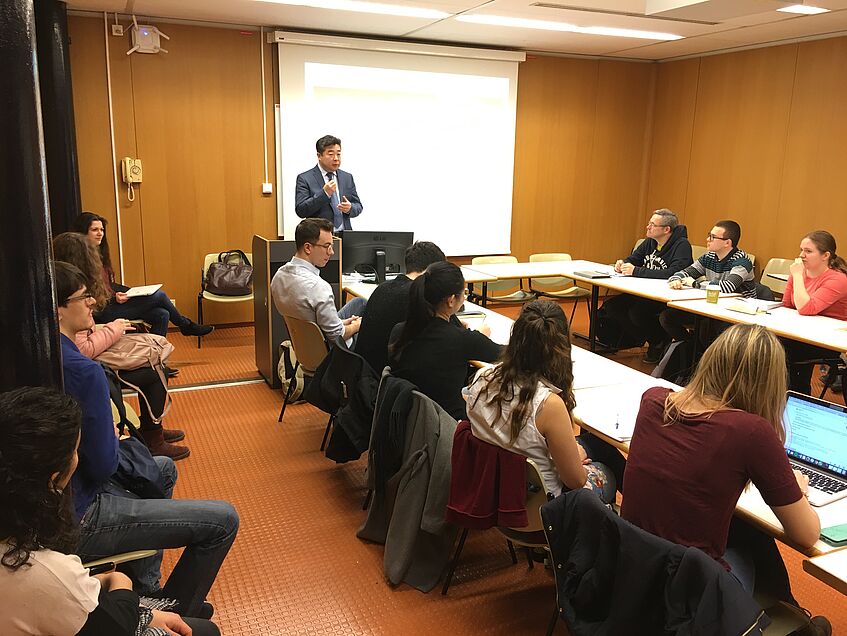
Professor WANG Chang giving a lecture about the legal system in China
Course: Legal System in China
In summer semester 2018 the University of Vienna offered a course on "Legal System in China", which was taught by Professor Wang Chang of the China University of Political Science and Law. Professor Wang Chang taught at Peking University, the University of Illinois and at the China Center of the University of Minnesota. He is an experiencend international project manager, a renowned scholar and a licensed attorney in the United States. He is an expert in Comparative Law and in International Business Development.
About the course:
The course took a comparative law approach in discussing the development of legal discourse, and the ever increasing influence of the Western jurisprudence, in modern and contemporary China. The formation of “Rule by Law” as a “grand narrative” in its historical context, the controversy around different interpretations of “Civil Rights”, and the burgeoning legal reform in the Mainland China was discussed in length.
The students enjoyed the lecture very much and made many positive comments about it, like for example:
"Prof. Wang’s (Chinese native, American lawyer) seminar provides students with a deep insight into China’s legal, political and economic system as of today. Students who are seeking qualified information on China, it's legal system, it's institutions, it's presence and possible future will highly profit from the lecture, the lively discussions and the unique way Prof. Wang combines a lecture on Chinese legal system with the utmost current developments of Chinese society and economy. Prof. Wang’s lecture introduces also to the thrilling and highly interesting Chinese history which is key for understand today’s modern China. A must have for all colleagues with a focus on the rapid developments of rising China and the Far East region. To put it in a nutshell: Highly recommendable!"
(Ralph P.)
Distinguished Lecture Series- Lecture of Professor Anne Black

Professor Black
Distinguished Lecture Series- Lecture of Professor Anne Black
On Friday Nov, 11th, 2017 Professor Anne Black gave a lecture on the topic „Islam, Sharia and Politics in Southeast Asia: the role of the law to transform society“.
Abstract:
This month Malaysia's nine sultans issued a statement in which they collectively condemned political actions taken in the name of Islam and expressed concern over rising ethno-religious polarization & intolerance. This stance from the nation's constitutional guardians of Islam is unprecedented but it highlights concerns across all of Southeast Asia that Islam is being captured and used for political purposes. The rationale of Sharia compliance has been employed to silence critics and to allow textualist or fundamentalist interpretations of Islam to dominate over the moderate views for which this vibrant and pluralistic region had been previously known.
Although Indonesia, Brunei and Malaysia are a long way from Austria what happens in Southeast Asia is important. Not only because Southeast Asia is home to the world's largest number of Muslims but because it has traditionally been a model for democracy, moderate views and tolerance. Yet with the growth of Islamist political parties, the increasing use of blasphemy, apostasy & morality laws, the promotion hudud and Sharia criminal laws, and reversion to more patriarchal interpretations of Sharia family law, Southeast Asia is changing. And law is the main vehicle by which the transformation is occurring.
This Event was organized by Professor Lewisch in cooperation with MAGNA.
